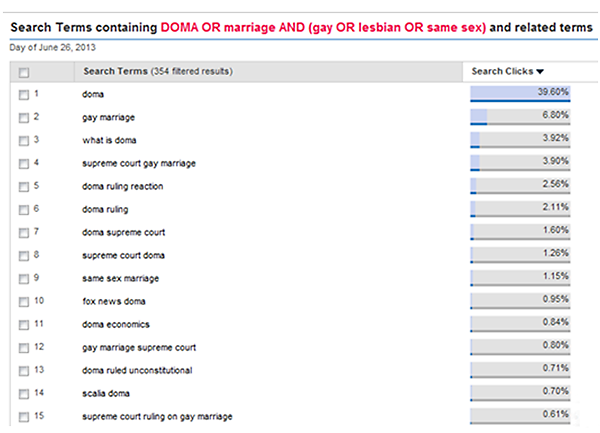Following Wednesday’s landmark decision by the Supreme Court to declare the Defense of Marriage Act (DOMA) unconstitutional, supporters of same-sex marriage rejoiced while detractors retreated. Search activity on Wednesday, June 26th underscores the type of information that US online users were seeking both before and after the ruling. Queries on the search term ‘doma’ increased 25x that of the previous day and topped the list of search term variations related to same-sex marriage. Other searches included ‘what is doma’, ‘doma ruling reaction’ and ‘doma economics’, which could be fodder for content in the coming weeks as discussions about the impact of the ruling continue.

For the search terms ‘doma’ and ‘what is doma’, Wikipedia was the top website to capture this traffic from people that wanted to learn more about the Defense of Marriage Act and its history. News websites like The Huffington Post and ABCNews.com were also popular destinations, along with social networks Facebook, YouTube and Twitter.

In the weeks leading up the Supreme Court’s ruling, searchers were curious about comments about gay marriage from NFL football player Adrian Peterson and Former Secretary of State Donald Rumsfeld. Additionally, searches revealed an interest in gay marriage in various states like Rhode Island and Minnesota as well as other countries like France and New Zealand.

Being able to see immediate search data gives marketers an important look at how consumers react to a sudden event. Real-time marketing has been growing in popularity since the famous Oreo tweet during the 2013 Superbowl Blackout, and gaining insights into real-time search activity enables marketers to react appropriately to landmark events in their customers’ lives.
Learn more about you can improve the timeliness of your campaigns with insights into customer search behavior and other intelligence about your consumers.